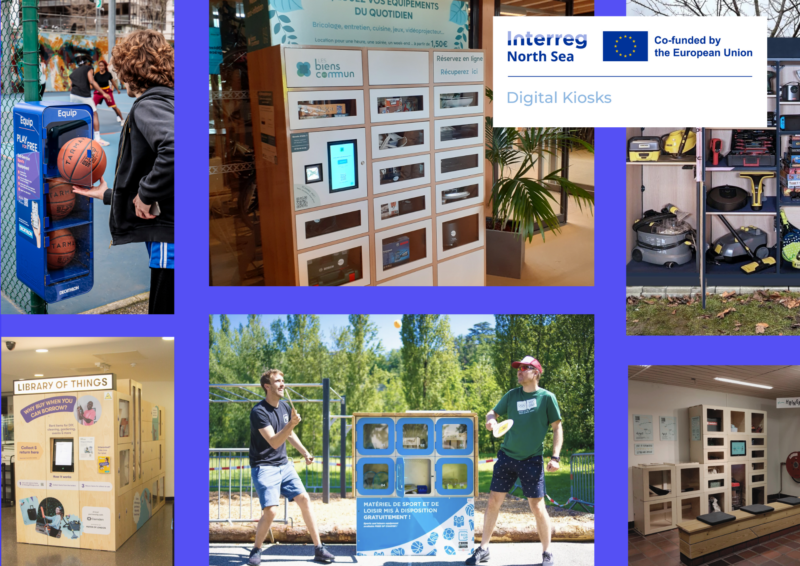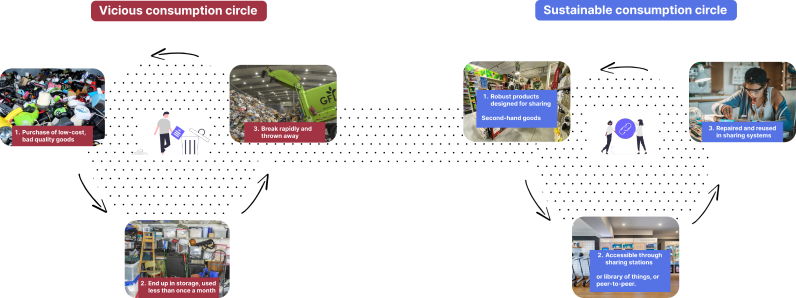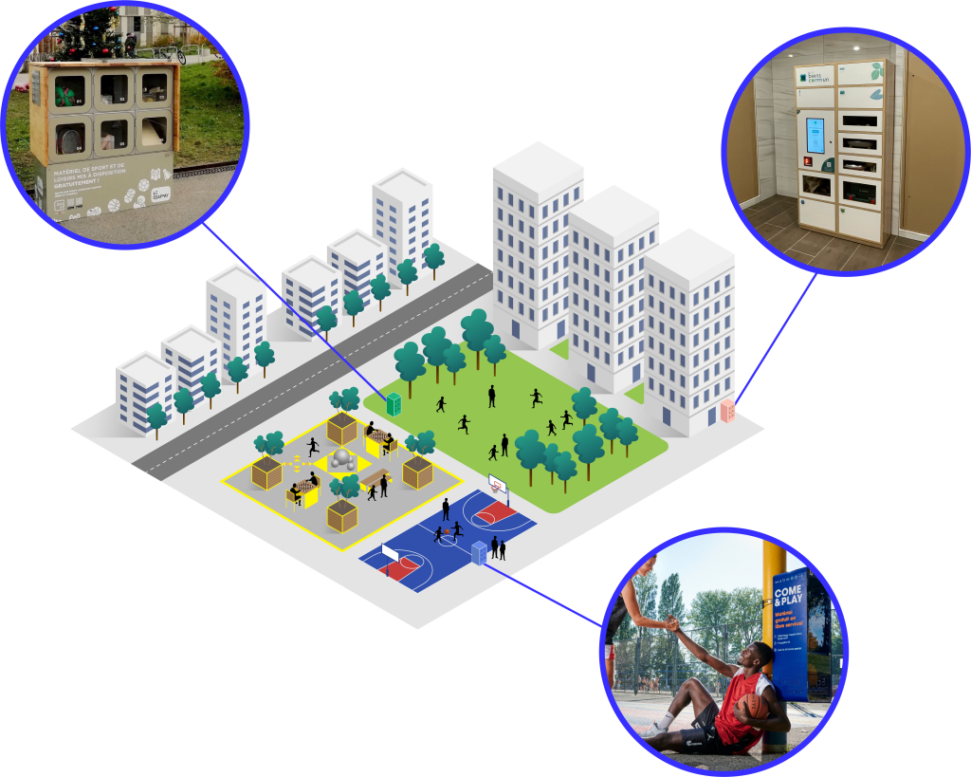Holland Circular Hotspot joins the Digital Kiosks initiative to deploy sharing stations and strengthen Europe’s sharing economy
September 25, 2024
Led by the City of Saint-Quentin in France and funded by the European Union through Interreg North Sea, a partnership of 12 cities and support organisations has set up the Digital Kiosks initiative to co-create, test, and evaluate 22 sharing stations in seven countries across Europe.

Digital Kiosks is preparing cities for the large-scale deployment of sharing stations
A European-wide alliance of municipalities, housing providers, research organisations, business support organisations, and European networks has united to accelerate the use of sharing stations across Europe.
Digital Kiosks partners will co-create, test, and evaluate new use cases, operating and business models for sharing stations. Funded by the Interreg North Sea programme, the €3.66m initiative is the first Europe-wide collaboration to build local sharing ecosystems through the co-creation, testing and evaluation of sharing stations to drive local sharing economy strategies for cities and housing associations.
Over the next three years, the Digital Kiosks initiative will:
- Deploy 22 sharing stations in six countries (France, Belgium, Germany, the Netherlands, Sweden, Denmark and Norway), tested by at least 5.000 end-users throughout the project
- Produce a Sharing Station Implementation Guide to advise any public authority or organisation interested in implementing sharing stations
- Design a Digital Kiosks Innovation Framework, a guideline document supporting the sustainable large-scale deployment of sharing stations
- Create a Community Engagement Toolkit for planning citizen engagement in the co-creation of sharing stations. It will cover the design, implementation, operation, and evaluation of sharing stations to understand citizens’ needs
- Grow the Digital Kiosks network, already including more than 30 sharing station providers, municipalities, housing providers, universities, and NGOs working together to support the sustainable implementation and commercialisation of sharing stations
Holland Circular Hotspot will play a key role in communication for the Digital Kiosks initiative. HCH will share the outcomes of the projects with new municipalities, regions, and circular economy centres throughout Europe, aiming to engage at least 90 organisations in dialogues to elevate the subject on the political agenda and unveil new market opportunities for sharing stations in the North Sea area.
The Digital Kiosks vision: from an all-consuming economy to a high-quality access economy
Digital Kiosks was launched with goal to address our broken consumption model. The average Westerner owns more than 10.000 goods, 80% of which are used less than 3 times per year. The average drill is only used for 12 minutes in its entire lifetime, and a vacuum cleaner goes unused for 98% of its entire lifespan. These items take huge amounts of energy and raw materials to produce. Yet, when our only option is to buy them, these objects sit on shelves, underused and gathering dust in every flat, house and office across Europe.
The sharing economy has the power to change this consumption paradigm. Instead of the vicious cycle of buying (often low-quality) goods that end up in closets and are quickly discarded, we can create a sustainable consumption cycle. This cycle emphasises sharing or renting durable products that are easily accessible to everyone through various access services and can be locally repaired and reused.

Sharing stations - the infrastructure for a sharing revolution
Sharing stations are a new form of infrastructure enabling citizens to engage in the sharing economies. A sharing station is a connected locker that holds goods for sharing in residential buildings, public spaces, businesses, etc, making it easy to access goods where they are needed.
Similar to shared bike systems, a user selects and reserves the goods on their phone, collecting it and putting the goods back into the station after use. Access to these goods is shared by multiple users, who can rent the items only when they need them.
Sharing stations have the power to make the access economy more convenient, visible and fun in cities. Compared to existing solutions, they provide a simple, reliable and cost-efficient service to access goods for a short amount of time in the city.

Testing new use cases for sharing stations
Digital Kiosks brings together sharing economy changemakers across Europe into a continent-wide taskforce for sharing economy planning and action. In total, 22 sharing stations will be deployed throughout the Digital Kiosks project, including 9 in public spaces, 2 in mobility hubs, 6 in building lobbies, and 5 in community spaces.
- Lead Partner City of Saint-Quentin will deploy 4 sharing stations and produce a strategy blueprint to anchor the sharing economy locally. Saint-Quentin will also manage the consortium and steer the project.
- The Wandsbek District of the City of Hamburg will co-create, test, and evaluate three sharing stations in three different locations. The District will work closely with the Circular Hub Nord to offer different learning and networking formats that enable actors to participate in and shape circular transformation in the District.
- The City of Amersfoort will test two sharing stations in housing residences and in public spaces, collaborating with local stakeholders to design the citizen engagement strategy to ensure its success.
- Social housing provider Familjebostäder will bring its perspective as one of the largest property owners in Gothenburg, Sweden, with roughly 19.000 apartments. Familjebostäder will collaborate with the City of Gothenburg, local tenant organisations, local libraries of toys, and local gardening organisations to test and evaluate three different sharing stations.
- Hogeschool Utrecht will focus on preparing the critical success factors for the design and implementation of sharing stations. This will also include the development of a methodology and tools to evaluate the social, economic and environmental impact of sharing stations.
- Ghent University will develop a framework to help partners determine a business and operating model for their sharing stations. This framework will draw from literature review and analysis of previous implementation of sharing stations.
- Business support organisation Euratechnologies will bring its expertise in supporting entrepreneurs and the development of innovative projects to help sharing station providers in developing their business and operating models. Euratechnologies will be involved in sourcing and encouraging the emergence of sharing station solutions from SMEs and supporting the market access and uptake of sharing station solutions, involving companies and public actors.
- The City of Bergen will implement three sharing stations mainly focusing on outdoor systems. Sharing stations will be deployed next to sports facilities and contribute to developing active environments and attractive meeting places for young people in the city.
- The City of Sint-Niklaas will be a pilot site for the implementation of three sharing stations including one to share home and garden equipment through a Circular Hub, another to share household goods and strengthen social cohesion in a socially vulnerable neighbourhood, and another in a public space to provide everyone with sport equipment to encourage physical activity.
- The Municipality of Vesthimmerland will deploy and monitor two sharing stations, engaging local communities in its many towns to foster a sharing economy.
- Social enterprise Kringwinkel Antwerp will test two sharing stations to explore its role in the logistics, customer engagement and operational efficiency of the sharing economy. The organisation, which employs 4.800 people, aims to understand how it can integrate sharing into its current operations collecting 84.000 tons of reusable items per year, ranging from household appliances to leisure equipment to bicycles.
- Holland Circular Hotspot (HCH) will play a key role in communication for the Digital Kiosks initiative. HCH will share the outcomes of the projects with new municipalities, regions, and circular economy centres throughout Europe, aiming to engage at least 90 organisations in dialogues to elevate the subject on the political agenda and unveil new market opportunities for sharing stations in the NS area.
Stay connected to our updates
Follow us on LinkedIn to stay informed about the Digital Kiosks project. Please address questions to info@digitalkiosks.org.
Digital Kiosks is an Interreg North Sea project co-funded by the European Union.
Project start: May 2024

